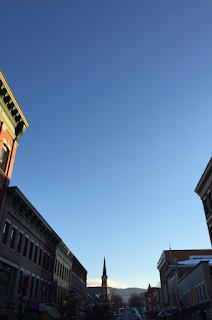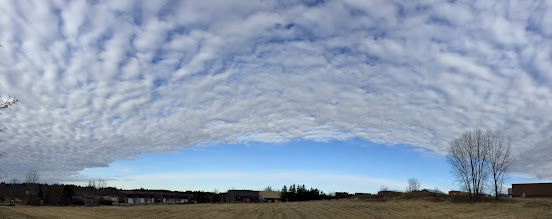It was a clear cold morning. December 13, 1852
Winter weather may be said to have begun yesterday. December 13, 1852
Now it will be a cheerful sight to see the snows descend and hear the blast howl. December 13, 1855
This morning it is snowing, and the ground is whitened. December 13, 1855
It seems an age since I took walks and wrote in my journal. December 13, 1851
Why have I ever omitted early rising and a morning walk? December 13, 1852
When shall I revisit the glimpses of the moon? December 13, 1851
River and ponds all open. December 13, 1852
Goose Pond skimmed over. December 13, 1852
The river is generally open again. December 13, 1856
The snow is mostly gone. In many places it is washed away down to the channels made by the mice, branching galleries. December 13, 1856
There is not so much ice in Walden as on the 11th. December 13, 1858
Goose Pond . . .and the like ponds are just covered with virgin ice just thick enough to bear, though it cracks about the edges on the sunny sides. December 13, 1857
You may call it virgin ice as long as it is transparent. December 13, 1857
I see the water-target leaves frozen in under the ice in Little Goose Pond. December 13, 1857
I see those same two tortoises (of Dec. 2d), moving about in the same place under the ice, which I can not crack with my feet. December 13, 1857
The Emerson children see six under the ice of Goose Pond to-day. December 13, 1857
Apparently many winter in the mud of these ponds and pond-holes. December 13, 1857
I see some of those great andromeda puffs still hanging on the twigs behind Assabet Spring, black and shrivelled bags. December 13, 1856
I observed a mouse run down a bush by the pond-side. December 13, 1852
He appeared to be a reddish brown above and cream-colored beneath, and ran swiftly down the stems. December 13, 1852
I think it must be the Gerbillus Canadensis, or perhaps the Arvicola Emmonsii, or maybe the Arvicola hirsutus, meadow mouse. December 13, 1852
Began to snow at noon. This the third snow; the first lasted half an hour on ground; the second, two or three days. December 13, 1852
The countless flakes, seen against the dark evergreens like a web that is woven in the air, impart a cheerful and busy aspect to nature. December 13, 1855
It is like a grain that is sown, or like leaves that have come to clothe the bare trees. December 13, 1855
It does. How pleasant a sense of preparedness for the winter, — plenty of wood in the shed and potatoes and apples, etc., in the cellar, and the house banked up! December 13, 1855
Its bright yellowish-green shoots are agreeable to my eye. December 13, 1851
We had one hour of almost Indian summer weather in the middle of the day. December 13, 1851
I felt the influence of the sun. It melted my stoniness a little. December 13, 1851
The pines looked like old friends again. December 13, 1851
Cutting a path through a swamp where was much brittle dogwood, etc., etc., I wanted to know the name of every shrub. December 13, 1851
There is a fine mizzling rain, which rests in small drops on your coat, but on most surfaces is turning to a glaze. December 13, 1858
Yet it is not cold enough for gloves even, and I think that the freezing may be owing to the fineness of the rain, and that, if it should rain much harder, even though it were colder, it would not freeze to what it fell on. December 13, 1858
It freezes on the railroad rails when it does not on the wooden sleepers. December 13, 1858
Already I begin to see, on the storm side of every twig and culm, a white glaze (reflecting the snow or sky), rhyming with the vegetable core. December 13, 1858
And on those fine grass heads which are bent over in the path the fine dew-like drops are frozen separately like a string of beads, being not yet run together. December 13, 1858
We stooped to examine, and I observed, about the base of the larger pin-weed, the frost formed into little flattened trumpets or bells, an inch or more long, with the mouth down about the base of the stem. December 13, 1852
They were very conspicuous, dotting the grass white. December 13, 1852
Though there were plenty of other dead weeds and grasses about, no other species exhibited this phenomenon. December 13, 1852
There is little if any wind, and the fine rain is visible only against a dark ground. December 13, 1858
A damp day brings out the color of oak leaves, somewhat as of lichens. December 13, 1858
They are of a brighter and deeper leather-color, richer and more wholesome, hanging more straightly down than ever. December 13, 1858
They look peculiarly clean and wholesome, their tints brought out and their lobes more flattened out, and they show to great advantage, these trees hanging still with leather-colored leaves in this mizzling rain, seen against the misty sky. December 13, 1858
There is a fine healthy and handsome scarlet oak . . . about thirty- five feet high and . . . very full of leaves, excepting a crescent of bare twigs at the summit. December 13, 1856
The leaves have a little redness in them. December 13, 1856
There is a dense growth of young birches from the seed in the sprout-land lot just beyond on the riverside, now apparently two or three years old, December 13, 1856
I judge from his account of the rise and fall of Flint's Pond that, allowing for the disturbance occasioned by its inlets and outlet, it sympathizes with Walden. December 13, 1852
I go this afternoon thinking I may find the stakes set for auction lots on the Ministerial Lot in December, '51. December 13, 1857
I find one white birch standing and two fallen. December 13, 1857
Thus in six years two out of three stout (two-and-a-half-inch) birch stakes were flat. December 13, 1857
A surveyor should know what stakes last longest. December 13, 1857
In sickness and barrenness it is encouraging to believe that our life is dammed and is coming to a head, so that there seems to be no loss, for what is lost in time is gained in power. December 13, 1857
All at once, unaccountably, as we are walking in the woods or sitting in our chamber, after a worthless fortnight, we cease to feel mean and barren. December 13, 1857
This varied employment, to which my necessities compel me, serves instead of foreign travel and the lapse of time. December 13, 1851
The river froze over last night, — skimmed over. December 13, 1850
It is the walk peculiar to winter, and now first I take it. December 13, 1859
I see that the fox too has already taken the same walk before me, just along the edge of the button-bushes, where not even he can go in the summer. We both turn our steps hither at the same time. December 13, 1859
April 8, 1854 ("A day or two surveying is equal to a journey")
May 6, 1854 ("It matters not where or how far you travel, — the farther commonly the worse, — but how much alive you are.")
August 6, 1851 ("It takes a man of genius to travel in his own country, in his native village")
August 19, 1854 ("Flint's Pond has fallen very much since I was here. The shore is so exposed that you can walk round, which I have not known possible for several years, and the outlet is dry.")
September 20, 1851 ("A fatal coarseness is the result of mixing in the trivial affairs of men.. . . I feel inexpressibly begrimed.")
November 21, 1852 ("I am surprised this afternoon to find the river skimmed over in some places, and Fair Haven Pond one-third frozen or skimmed over”)
November 26, 1858 ("And what is remarkable, I find that not only Goose Pond also has fallen correspondingly within a month, but even the smaller pond-holes only four or five rods over, such as Little Goose Pond, shallow as they are.")
December 5, 1853 ("Fair Haven Pond is skimmed completely over.")
December 5, 1856 ("The river is well skimmed over in most places,")
December 5 1856 ("The johnswort and the larger pinweed are conspicuous above the snow.")
December 9, 1856 (" Fair Haven was so solidly frozen on the 6th that there was fishing on it,")
December 9, 1859 ("The river and Fair Haven Pond froze over generally last night, though they were only frozen along the edges yesterday. This is unusually sudden.")
December 11, 1858 ("Walden is about one-third skimmed over.")
December 11, 1854 ("C. says he found Fair Haven frozen over last Friday, i. e. the 8th.")
December 14. 1851 ("The boys have been skating for a week, but I have had no time to skate for surveying. I have hardly realized that there was ice, though I have walked over it about this business.")
December 15, 1855 ("The boys have skated. a little within two or three days, but it has not been thick enough to bear a man yet.")
December 15, 1855 ("The low grass and weeds, bent down with a myriad little crystalline drops, ready to be frozen.”)
December 16, 1850 ("The river is probably open again.")
December 18, 1859 (“The withered oak leaves, being thoroughly saturated with moisture, are of a livelier color.”)
December 18, 1858 ("The pond is merely frozen a little about the edges. I see various little fishes lurking under this thin, transparent ice, close up to the edge or shore, especially where the shore is flat and water shoal.")
December 23, 1859 ("The pinweed — the larger (say thymifolia) — pods open, showing their three pretty leather-brown inner divisions open like a little calyx, a third or half containing still the little hemispherical or else triangular red dish-brown seeds.")
December 25, 1858 (“I notice that a fox has taken pretty much my own course along the Andromeda Ponds.”)
December 31, 1854 ("The white oak leaves are a cinnamon-color, the black and red oak leaves a reddish brown or leather-color.’)
January 10, 1851 ("I have met with but one or two persons in the course of my life who understood the art of taking walks daily,")
February 19, 1854 ("I incline to walk now in swamps and on the river and ponds, where I cannot walk in summer.")














